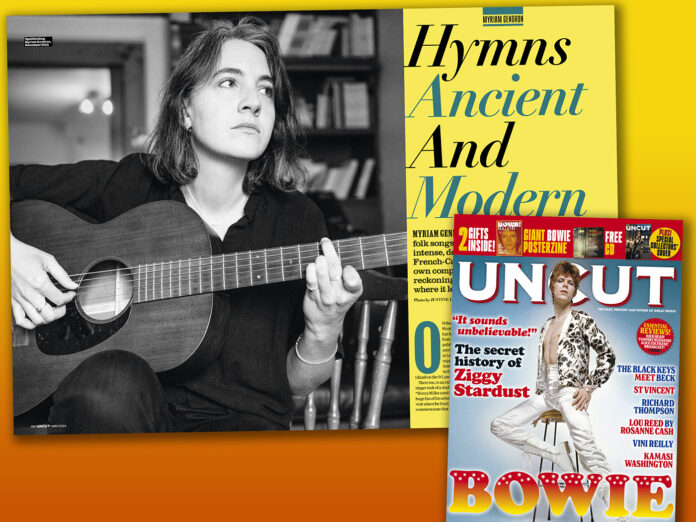In this month’s Uncut, we speak to Myriam Gendron, the enigmatic French-Canadian artist who has been quietly transforming folk songs and Dorothy Parker poems with intense, delicate results. With a new album of her own compositions imminent, we hear her remarkable story.
In this month’s Uncut, we speak to Myriam Gendron, the enigmatic French-Canadian artist who has been quietly transforming folk songs and Dorothy Parker poems with intense, delicate results. With a new album of her own compositions imminent, we hear her remarkable story.
Now read on for an extract from our interview…
DAVID BOWIE IS ON THE COVER OF THE LATEST UNCUT – ORDER YOUR COPY HERE
On the wall of the music room in her Montreal home, Myriam Gendron has hung several posters: one from a party to celebrate the poetry publishing house run by her partner; another from a Michael Hurley show at La Vitrola, where Gendron played support; and a billing for Pour La Suite du Monde, a documentary set in the fishing community of a small island on the St Lawrence River.
There too, is an enlarged print of a photograph the singer took of a studio house on Villa Seurat in Paris. “Henry Miller used to live there,” she says. “I was a huge fan of Henry Miller when I was a teenager, so I went to visit where he lived.” The picture she took to commemorate that day did not turn out as planned; a problem with the camera film distorting the image of the street. She gestures to the white flare that blooms across the photograph. “But I thought it was beautiful,” she says. “I’ve always had it.”
It is simplistic to suggest that this collection of artworks fully encapsulates Gendron, yet there is something in their marriage of literature, music, tradition that seems to carry her essence. It is there even in that unanticipated flash of beauty of the Miller picture — a kind of illuminating effect between expectation and actuality.
Over the past decade, Gendron has established herself as an artist of immense craft and interpretive instinct. Her first album, 2014’s Not So Deep As A Well, set the poetry of Dorothy Parker to music and became a quiet cult hit. Her second, 2021’s Ma Délire, Songs Of Love, Lost And Found, saw her reinterpret and explore traditional material from Canadian folk tunes such as “Au Coeur de Ma Délire” and “Le Tueur de Femmes” to more familiar and long-storied songs such as “Go Away From My Window” and “Shenandoah” — alongside a couple of her own compositions.
Her voice is a curious thing, capable of moving from dark siltiness to startling clarity across a single line, giving the impression of something forever being heaved up from depth to light. Her musical approach is a similar dance of structure and dissemblage. “She’s spellbinding,” says Will Oldham, who took Gendron on tour last autumn. “I started listening to Ma Délire over and over and over again, then got Not So Deep As a Well. That was during a time when I had a group of songs that I was trying to polish with the intention of making Keeping Secrets Will Destroy You. I found that Myriam’s two records were things that I returned to for inspiration. For a powerful distilled intentional presentation of superficially simple arrangements of complex pieces of music. I can listen to her records all day, every day.”
In conversation Gendron is a measured presence. She speaks in English, with the occasional Quebecois twist to her sentences and when she touches on certain subjects her guarded air gives way suddenly — her face lighting up as she discusses the favourite of her seven guitars, say, or the freedom she finds in writing instrumental music “because words lock up meaning.”
For a couple of years, Gendron has spent the bulk of her days in her music room, slowly shifting from reinterpreting the words and compositions of others into the new terrain of her own songwriting. It has proved a strange and sometimes mystical process. “Sometimes I feel more like a witness to what I do,” is how she describes it. “It’s like you’re channeling something, you don’t really know what’s happening, and there it is.”
In this way, Gendron crafted the songs that make up her third album, Mayday. It is a stunning record, encompassing the loss of her mother amid a broader and more intangible sense of grief that she struggles now to articulate. “It was not only my mother, it was trying to be open to a more general sense of loss that anyone can relate to,” she says. “Everyone’s lost something. I think we all have this within ourselves. It’s like an original lost paradise story. The oldest story in the world. We all miss something, maybe it’s been there ever since we were born.”
As she speaks, my eye is drawn back to the posters on her wall, and to a work by the artist Catherine Ocelot, who Gendron recently commissioned to work on the merchandise for her forthcoming album. Gendron turns and looks at the picture for a moment. “It’s a beautiful drawing,” she says. “I just got it. It’s a woman crying into her plant. And the plant is huge.”
Read the full feature only in the latest edition of Uncut – in shops now and available to buy direct from us here
Mayday is released on May 10 via Thrill Jockey & Feeding Tube and can be pre-ordered here



